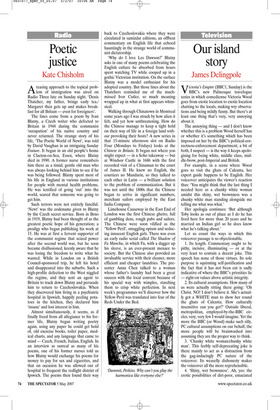Poetic justice
Kate Chisholm
Ateasing approach to the topical problem of immigration was aired on Radio Three late on Sunday night. ‘Denis Thatcher, my father, brings early tea./ Margaret then gets up and makes breakfast for all Britain — even for foreigners’.
The lines come from a poem by Ivan Blatny, a Czech writer who defected to Britain in 1948 during the communist ‘occupation’ of his native country and never returned. The strange story of his life, ‘The Poetic World of Newt’, was told by David Vaughan in an intriguing Sunday Feature. It began in an old people’s home in Clacton-on-Sea, Essex, where Blatny died in 1990. A former nurse remembers him there as a timid, gentle old man who was always looking behind him to see if he was being followed. Blatny spent most of his life in England in various institutions for people with mental health problems. He was terrified of going ‘out’ into the world, scared that someone was going to get him.
Such terrors were not entirely fanciful. ‘Newt’ was the codename given to Blatny by the Czech secret service. Born in Brno in 1919, Blatny had been thought of as the greatest poetic hope of his generation; a prodigy who began publishing his work at 15. He was at first a fervent supporter of the communist regime that seized power after the second world war, but he soon became disillusioned, keenly aware that he was losing the freedom to write what he wanted. While in London on a British Council-sponsored trip, he left his hotel and disappeared into the suburbs. Such a high-profile defection to the West niggled the regime, and they sent an agent to Britain to track down Blatny and persuade him to return to Czechoslovakia. When they discovered him living in a psychiatric hospital in Ipswich, happily peeling potatoes in the kitchen, they declared him ‘insane’ and lost interest in him.
Almost simultaneously, it seems, as if finally freed from all allegiance to his former life, Blatny began writing poetry again, using any paper he could get hold of, old exercise books, toilet paper, medical charts, and any language that came to mind — Czech, French, Italian, English. In an interview as surreal as many of his poems, one of his former nurses told us how Blatny would exchange his poems for money to pay for sex and cigarettes, and that on occasion he was allowed out of hospital to frequent the redlight district of Ipswich. The poems then found their way back to Czechoslovakia where they were circulated in samizdat editions, an offbeat commentary on English life that echoed hauntingly in the strange world of communist dictatorship.
‘Why do I love Les Dawson?’ Blatny asks in one of many poems celebrating the English culture he absorbed from hours spent watching TV while cooped up in a gothic Victorian institution. On the surface Blatny was a model enthusiast for his adopted country. But those lines about the Thatchers reminded me of the muchmissed Ivor Cutler, so much meaning wrapped up in what at first appears whimsical.
Walking through Chinatown in Montreal some years ago I was struck by how alien it felt, and yet how unthreatening. How do the Chinese manage to keep a tight hold on their way of life in a foreign land without provoking their hosts? A new series in that 15-minute afternoon slot on Radio Four (Mondays to Fridays) looks at the Chinese in Britain. It began not where you might expect — in a Soho takeaway — but at Windsor Castle in 1686 with the first recorded visit of a Chinaman to the court of James II. He knew no English, the courtiers no Mandarin, so they talked to each other in Latin — a brilliant solution to the problem of communication. But it was not until the 1800s that the Chinese began to arrive in significant numbers, merchant sailors employed by the East India Company.
Limehouse Causeway in the East End of London was the first Chinese ghetto, full of gambling dens, rough pubs and sailors. The Chinese were soon vilified as the ‘Yellow Peril’, smuggling opium and seducing innocent English girls. There was even an early radio serial called The Shadow of Fu Manchu, in which Fu, with a dagger up his sleeve, is an ever-present menace to society. But the Chinese also provided an invaluable service with their cleaner, more efficient and cheaper laundries. The presenter Anna Chen talked to a woman whose father’s laundry had been a great success with the local convent because of his special way with wimples, starching them to crisp white perfection. In next week’s programmes we’ll discover how the Yellow Peril was translated into fear of the Reds Under the Bed.


































































































 Previous page
Previous page